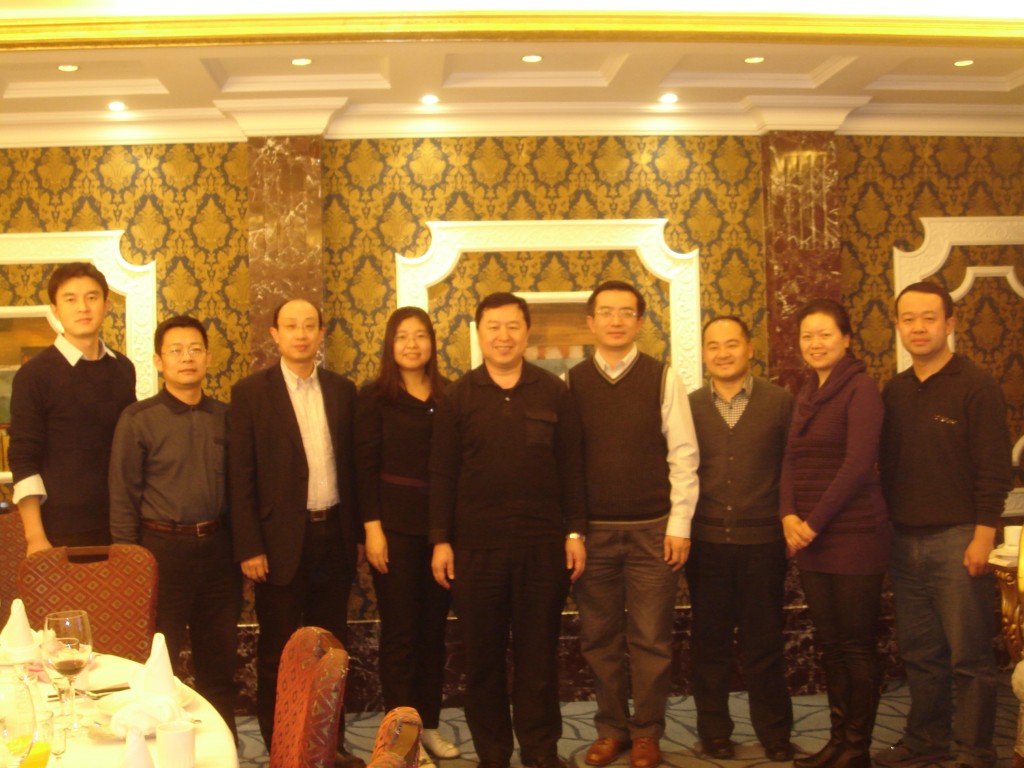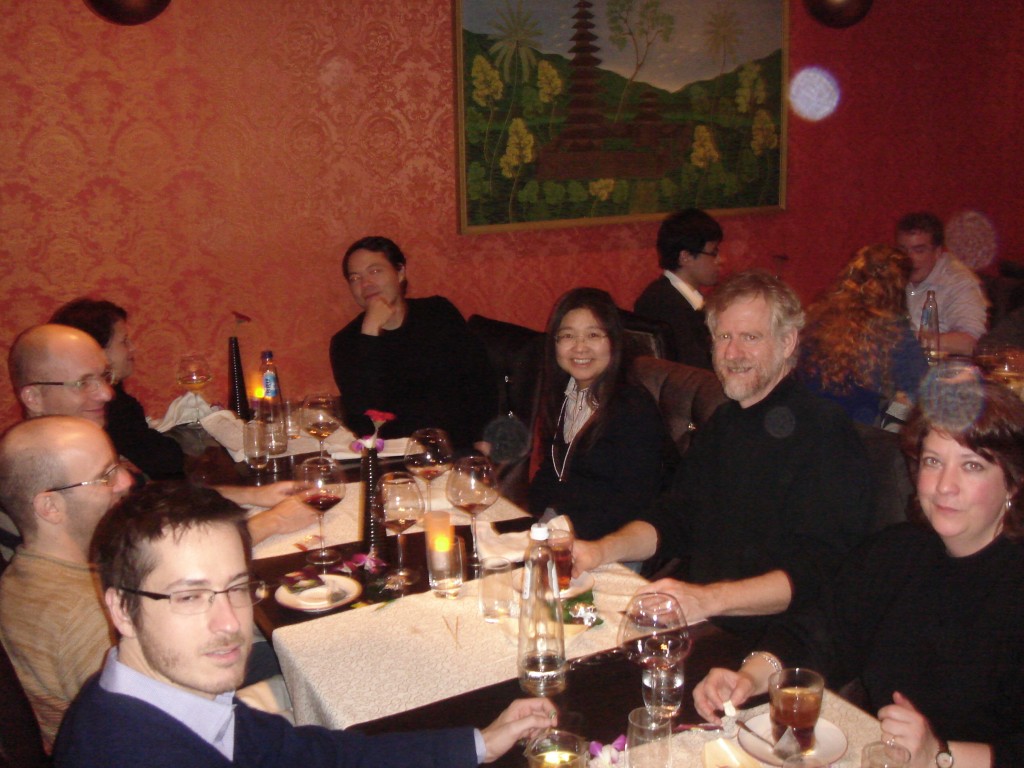April 10, 2012 at 4:32 pm
· Filed under Archives, Conferences, Internet Governance

The First International Conference organized by the Institute of Global Internet Governance and Advocacy at NALSAR University of Law was held on April 5-6, 2012 in Hyderabad, India. The Conference was named “Revisiting Internet Governance–Lessons Learned and Road Ahead”.
It was not a pleasant journey for me at all. I transferred from Bangkok. After waiting in non-aircon terminal of Royal Thai for 40 mintues, I finally boarded the flight from Bangkok to Hyderabad. Everything was fine until some drunk man hit my head and knocked leaned my glasses. It was incredible. Incredible India indeed. The glassed was fixed once at a local optical but still unusable. I had to put up with the whole week and the following one without glasses. It cost me more than $1,000 to make a new pair after coming back to Beijing. So it was a very expensive trip in my memory.
The conference itself was not bad. I talked in the first panel on an assigned topic “Adding a Billion–Challenges in Asia Pacific Word”. As always, I tried to present the dry topic interestingly. I specifically touched the issues of imposition of legal obligation on ccTLDs and legal enforcement’s threat to DNS neutrality. People from France, Japan, Jamaica and Gambia joined the conference as well. The domestic present was very impressive. Everyone I know in India showed up. In my blurred view (without glasses), they made forceful presentations from different prospective. Incredible equally.
Permalink
March 21, 2012 at 9:50 am
· Filed under Archives, Conferences, IDNs, Internet Governance
 ICANN 43rd International Meeting was held in San Jose, Costa Rica on March 11-16, 2012. The cloudy great volcano likes wearing a white hat, symbolizing the most green country in Caribbean sea. It was a long trip from Beijing to Los Angeles to San Salvador to San Jose, almost 2 days on road. The tiredness did not prevent a group of us from driving a few hundred of miles to visit the Volcano. After enjoying a volcanic hot spring and a short night in a country inn, we drove to the Great One in the early morning. Unfortunately, we did not see the miracle circle top in the white cloudy dawn. But a a visit to a mountain-view was pleasure and refreshing. Then another long drive back to the conference hall in Ramada Hotel. I immediately joined the ccNSO Strategic Operational working group meeting.
ICANN 43rd International Meeting was held in San Jose, Costa Rica on March 11-16, 2012. The cloudy great volcano likes wearing a white hat, symbolizing the most green country in Caribbean sea. It was a long trip from Beijing to Los Angeles to San Salvador to San Jose, almost 2 days on road. The tiredness did not prevent a group of us from driving a few hundred of miles to visit the Volcano. After enjoying a volcanic hot spring and a short night in a country inn, we drove to the Great One in the early morning. Unfortunately, we did not see the miracle circle top in the white cloudy dawn. But a a visit to a mountain-view was pleasure and refreshing. Then another long drive back to the conference hall in Ramada Hotel. I immediately joined the ccNSO Strategic Operational working group meeting.
From Monday I have been busy with a variety of meetings in different constituencies. In the afternoon, I noted the seriously biased IDN Variants Project Plan and had a long debate with the ICANN team to be funded by million of dollars against their unfair treatment to Chinese-character set.
Tuesday was a busy day full of ccNSO meetings. I made a presentation in the most interesting session of the whole meeting, “law enforcement”. After a couple of boring briefings on SOPA bills etc., MX and KR, my presentation on the domain names real names campaign attracted huge attention. People from GNSO or other stakeholder group joined the meeting and kept asking questions. What’s interesting was that a few non-professional and self-nominated “cyber-watchers” irresponsibly reported my presents to the domestic authorities, which got me in trouble later on after my coming back to Beijing. Were they officious or wicked? I don’t know but they did waste tax-payers’ money to travel 10,000 miles to espionage me in San Jose. On the other hand, Internet-cleaning campaign was propagated by themselves as a big achievement. Idiots ain’t they?
Poor me was working hard to organizing a Chinese community meeting when being spied by these brainless amateur spies. I chaired a land-mark swimming pool meeting on Wednesday morning. I briefed them on IDN variant issues and the threat of project plan, and addressed the trademark clearing house. Then I arranged the group of people to attend the different meetings to voice the Chinese community’s concerns. Knet, Conac, dotAsia, Cnnic and a few new gTLD applicants and registrars joined the meeting. On Wednesday morning, I gave another speech on registrations by individuals under dotCN. I assume it succinctly follows the lines this time. Whose line is it anyway?
Thursday morning I spent a little time in the downtown of San Jose. It was pretty small but reasonable. I came back in time for the public forum in the afternoon. Surprisingly there were not many tough questions this time. People got tired after debating for more than 10 years.
Friday morning I took a walk on the Golf Course nearby but was lost eventually. That was bad experience and also a bad sign actually–the beginning of my long torment. I’m leaving for the airport at noon. I lost my luggage en route–San Jose to Miami to Los Angeles to Beijing. I suffered terribly in those 5 days.
Permalink
March 9, 2012 at 11:49 am
· Filed under Archives, Conferences, Internet Governance
 2012年3月6日,由北京师范大学互联网政策与法律研究中心主办的互联网治理国际研讨会在法学院18层高铭暄学术报告厅举行。北京师范大学法学院副院长张红副教授、互联网政策与法律研究中心主任薛虹教授、ICANN前任理事Jean-Jacques Subrenat、中国互联网信息中心(CNNIC)相关专家、北龙中网(ChinaNet)和京东商城等相关实务界人士、法学院部分研究生等出席了此次会议。
2012年3月6日,由北京师范大学互联网政策与法律研究中心主办的互联网治理国际研讨会在法学院18层高铭暄学术报告厅举行。北京师范大学法学院副院长张红副教授、互联网政策与法律研究中心主任薛虹教授、ICANN前任理事Jean-Jacques Subrenat、中国互联网信息中心(CNNIC)相关专家、北龙中网(ChinaNet)和京东商城等相关实务界人士、法学院部分研究生等出席了此次会议。
研讨会由薛虹教授主持。薛虹教授注重讲解了互联网治理的三大关键问题,即Global public interest, management of CIRs and multi-stakeholder model, 并结合国际法原则和规范加以分析。
Jean-Jacques Subrenat 围绕互联网治理政策发表了精彩演讲。演讲首先简要介绍了互联网的起源;之后提到了网络发展的现状以及规则的变化,这一部分从使用者、互联网利益、规则制定者等三个方面进行了分析;接下来讲了全球化的动机和现有模式面临的挑战,这一部分教授从利润、互联网控制、人类发展进行了分析,引入了MSM等治理模式;最后提到了如何构建合理的模式来推进网络发展。
演讲结束后,与会嘉宾对Jean-Jacques Subrenat 的演讲做了评议并提出了问题。Jean-Jacques Subrenat教授对问题都做出了解答与回应,讨论热烈。在交流互动环节,我院诸多青年学子们也积极参与其中,纷纷提问和发言,和与会专家探讨了许多有关互联网综合治理的问题。薛虹教授和Jean-Jacques Subrenat教授都对这些问题做了耐心解答。最后,薛虹教授对本次研讨会做了总结性发言,她针对进一步推进互联网治理提出了自己的观点,也对青年学子表达了自己的期许,会议在活跃而融洽的气氛中圆满结束。
Permalink
February 19, 2012 at 4:41 pm
· Filed under Archives, Conferences, Internet Governance, Legal News
 The Year of 2011 just left a score of days but there are a couple of things that would be carried on. One of them was the drafting of the Regulations on the Administration of Internet Retails. After working hard for half of a year, 25th draft had been completed and forwarded for the Final Review by the Legislative Office of the State Council. The drafting work for the Regulations was delegated to the E-Commerce Department of the Ministry of Commerce and a group of leading experts on e-commerce and Internet governance. The Regulations touch the most critical issues in the Internet retails, that is the the Intermediaries of transactions. They are called 3-rd party transactional platform service providers. Unlike the direct retail operators, online and/or offline, these intermediaries have become the nexus of transactions between the sellers and the consumers. Their legal and social responsibilities, their obligation to both sellers and consumers significantly impact the whole process of e-commerce and eventually the national economy. The Regulations, which will be the first legal document issues by the State Council on Retail issues, are expected to provide a healthier legal environment for the sustainable development of e-commerce in China.
The Year of 2011 just left a score of days but there are a couple of things that would be carried on. One of them was the drafting of the Regulations on the Administration of Internet Retails. After working hard for half of a year, 25th draft had been completed and forwarded for the Final Review by the Legislative Office of the State Council. The drafting work for the Regulations was delegated to the E-Commerce Department of the Ministry of Commerce and a group of leading experts on e-commerce and Internet governance. The Regulations touch the most critical issues in the Internet retails, that is the the Intermediaries of transactions. They are called 3-rd party transactional platform service providers. Unlike the direct retail operators, online and/or offline, these intermediaries have become the nexus of transactions between the sellers and the consumers. Their legal and social responsibilities, their obligation to both sellers and consumers significantly impact the whole process of e-commerce and eventually the national economy. The Regulations, which will be the first legal document issues by the State Council on Retail issues, are expected to provide a healthier legal environment for the sustainable development of e-commerce in China.
In addition to the pending Regulations, the Ministry of Commerce is drafting a set of administrative measures to regulate the transactional rules of the 3rd-party transactional platforms, such as Tmall, 360buy, Dangdang. Transactional rules are a series of public rules that are unilaterally prepared by a 3rd-party transactional platform, applicable to any one doing transactions on the given platform, and affect public interest. The expert panel, along with the official from the Ministry of Commerce, had a meeting devoting to these administrative measures in Baoting, a town close to Sanya, Hainan Province on February 17-20, 2012. The 5th draft of the administrative measures has been completed and is now ready for ministerial review.
Permalink
December 18, 2011 at 9:36 pm
· Filed under Archives, Conferences, Intellectual Property, Legal News
 A group of IP legal experts gathered in Amsterdam just before Christmas 2011 to discuss the copyright limitations and exceptions in the international law as well as domestic laws. The meeting is not a large one but invited the scholars from US, China, Brazil, Colombia, Israel, UK, Australian, Canada, Germany, France and Netherlands. The meetings began with the categorized studies on the different legal approaches in European Continental countries, Anglo-Common Law, fair-use countries and other civil countries. The discussion then moved on to 3-step and its application in both international and domestic law. The meeting also addressed the correlation between the L&E and spiritual rights, personal rights (such as right of names and reputations), and technological measures. The short but interesting gathering inspired the attendees to meet again in other occasions whenever possible, including a workshop in China in 2012.
A group of IP legal experts gathered in Amsterdam just before Christmas 2011 to discuss the copyright limitations and exceptions in the international law as well as domestic laws. The meeting is not a large one but invited the scholars from US, China, Brazil, Colombia, Israel, UK, Australian, Canada, Germany, France and Netherlands. The meetings began with the categorized studies on the different legal approaches in European Continental countries, Anglo-Common Law, fair-use countries and other civil countries. The discussion then moved on to 3-step and its application in both international and domestic law. The meeting also addressed the correlation between the L&E and spiritual rights, personal rights (such as right of names and reputations), and technological measures. The short but interesting gathering inspired the attendees to meet again in other occasions whenever possible, including a workshop in China in 2012.
Permalink




